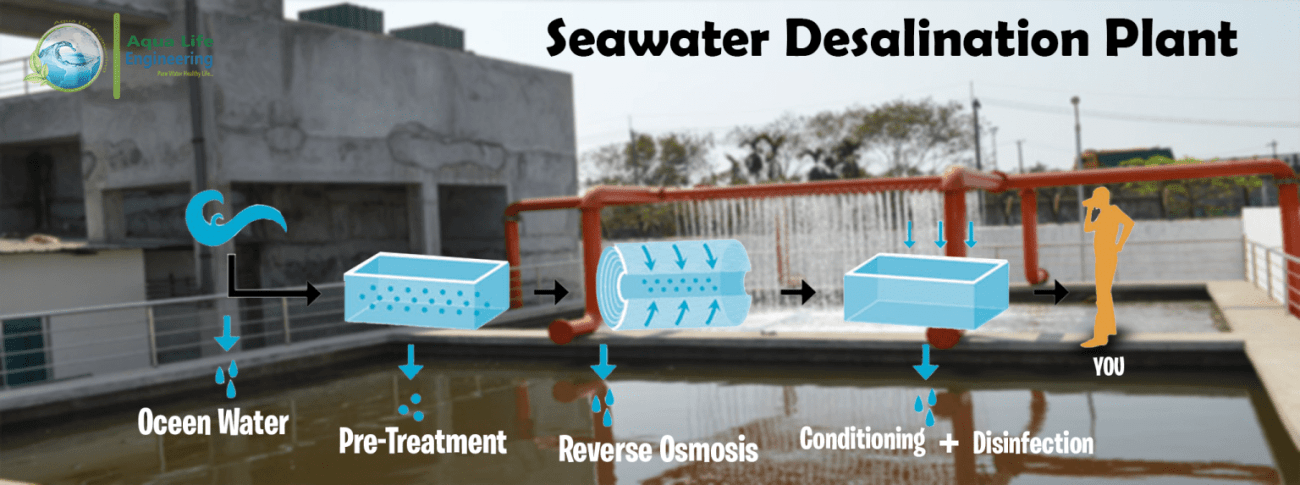
SEAWATER DESALINATION PLANT
A seawater desalination plant is an innovative solution for converting saltwater into fresh, drinkable water. This advanced system addresses the growing need for potable water in coastal and water-stressed regions. It’s a cost-effective and energy-efficient method that uses cutting-edge technologies like reverse osmosis to deliver safe water for residential, commercial, and industrial applications.
At Aqualife Engineering, we specialize in designing and supplying high-quality seawater desalination plants that are tailored to the needs of Bangladesh. Our systems are built to provide sustainable water solutions, ensuring reliability and efficiency even in challenging environments.
—
How Does Seawater Desalination Work?
Seawater desalination works by removing salt, minerals, and other impurities from seawater to make it suitable for consumption. The process typically involves:
1. Seawater Intake: Water is drawn from the ocean through specially designed intake systems.
2. Pretreatment: Suspended solids, debris, and contaminants are filtered out to protect the membranes.
3. Reverse Osmosis (RO): Using high-pressure pumps, water is forced through semi-permeable membranes that block salt and other impurities.
4. Post-treatment: The desalinated water is treated to balance minerals and improve taste, making it ready for use.
5. Brine Disposal: The concentrated saline byproduct is safely managed.
—
Types of Seawater Desalination Plants
At Aqualife Engineering, we offer two main types of desalination plants:
Reverse Osmosis (RO) Plants: These systems use high-pressure membranes to filter out salt and impurities, ensuring superior water quality.
Thermal Desalination Plants: Utilizing heat to evaporate and condense seawater, this method is ideal for large-scale operations.
Both systems are designed to meet the unique demands of industries, municipalities, and coastal communities in Bangladesh.
—
Why Choose Aqualife Engineering?
Proven Expertise: With years of experience, we are a trusted name in seawater desalination solutions.
Custom Designs: Our systems are tailored to the specific requirements of Bangladesh’s coastal and urban areas.
Eco-Friendly Solutions: We prioritize sustainability by ensuring minimal environmental impact and efficient energy use.
Comprehensive Support: From design and installation to maintenance, our team provides end-to-end service.
Affordability: Competitive pricing makes our solutions accessible to a wide range of customers.
—
Benefits of Our Seawater Desalination Plants
Reliable access to clean, safe drinking water.
Cost-effective operation with low energy consumption.
Long-lasting and durable systems requiring minimal maintenance.
Suitable for residential, industrial, and agricultural applications.
Helps reduce dependence on limited freshwater resources.
—
Applications of Seawater Desalination Plants
Our plants are widely used in:
Municipal water supply systems.
Industrial processes requiring high-purity water.
Agricultural irrigation in coastal regions.
Emergency water supply during droughts.
—
Frequently Asked Questions
1. Is desalinated water safe to drink?
Yes, desalinated water is safe for drinking. Our systems ensure that water meets all health and safety standards, free from impurities and contaminants.
2. What is the cost of a seawater desalination plant?
Costs vary based on the plant’s capacity and technology. Contact us for a tailored quote that fits your needs and budget.
3. How efficient are reverse osmosis systems?
RO systems are highly efficient, removing up to 99% of salts and impurities while maintaining low operational costs.
4. How can I install a seawater desalination plant?
Our team at Aqualife Engineering provides complete installation services, ensuring seamless operation and reliable performance.
—
For dependable seawater desalination solutions in Bangladesh, trust Aqualife Engineering. Contact us today to discuss your requirements and discover how we can help solve your water challenges effectively!
